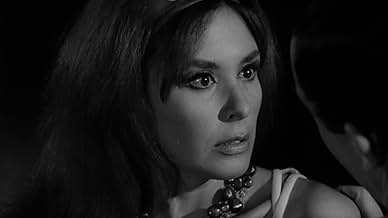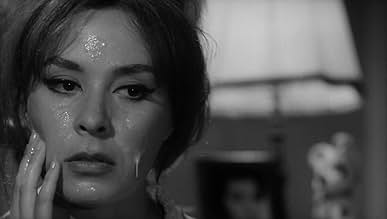Zwei Schwestern, zwischen denen eine turbulente Geschwisterrivalität besteht, suchen im Madrid der 60er Jahre nach Erfolg, Liebe und Status.Zwei Schwestern, zwischen denen eine turbulente Geschwisterrivalität besteht, suchen im Madrid der 60er Jahre nach Erfolg, Liebe und Status.Zwei Schwestern, zwischen denen eine turbulente Geschwisterrivalität besteht, suchen im Madrid der 60er Jahre nach Erfolg, Liebe und Status.
Fernando Fernán Gómez
- Faustino
- (as Fernando Fernan-Gomez)
Agustín González
- Don Andrés
- (as Agustin Gonzalez)
Francisco Pierrá
- Agapito
- (as Francisco Pierra)
José Morales
- Rodolfo
- (as Jose Morales)
Fernando Guillén
- Rafa
- (as Fernando Guillen)
José Calvo
- Dueño Bar
- (as Jose Calvo)
José María Caffarel
- Julito
- (as Jose Maria Caffarel)
Joaquín Pamplona
- Comisario
- (as Joaquin Pamplona)
María Luisa Ponte
- La Alpujarreña
- (as Maria Luisa Ponte)
Ana María Noé
- Lina
- (as Ana Maria Noe)
Antonio Jiménez Escribano
- Don Paco
- (as Antonio G. Escribano)
Handlung
WUSSTEST DU SCHON:
- WissenswertesThe film was only released in one theater in Bilbao on July 10th, 1965. In 2015, 50 years later, a copy of the film was restored and re-released in Madrid, and later released on DVD and Blu-ray for the first time in Spain.
Ausgewählte Rezension
Splendid but overlong movie that mingles intense drama , urban conventionality , criticism , social habits and heartrending tragedies. It begins with a prologue regarding a quote by Fray Luis de León. It deals with a family living at Chueca square in 1960s Madrid, being formed by the distressed father, municipal guard, Agapito (Francisco Pierrá) , good mother , housewife Eloisa (Mercedes Leal) and two sisters : the badly married Elisa (Lina Canalejas), and independient Luisa (Gemma Cuervo) who have a thunderous rivalry each attempts to success, love, and social status ; along with the blissful and religious Rodolfo (José Morales) who is usually praying . As Elisa is married a hopeless waiter (Fernando Fernán Gómez) who is really obsessed to win pools to get a fortune .
The film is a thought-provoking and interesting social drama with engaging portrayals based on the realist novella of the same title written (1960) by Juán Antonio Zunzunegui . This is not the typical drama by that time , here there is a deep social denounce about the repression during Franco dictatorship , dealing with a peculiar family developing the extreme competence , ambition , rivalry , envy and egoism of their misfit members . Highly acclaimed pic offering an atmospheric and evocative cinematography in black and white , the film is widely considered a classic of Spanish cinema . This is almost a ¨Folletin¨ , an agreeable but depressing picture with a lot of unfortunate and hapless roles , dealing with the lives of the members of a family with a tumultuous and violent , at times, sibling rivalry and set in a repressed society resulting in tragic consequences. The main actors give fabulous interpretations , such as : Lina Canalejas , Gemma Cuervo , Mercedes Leal and Fernando Fernán Gómez . They are well accompanied by a good support cast with plenty of familiar faces , such as : Agustin Gonzalez , Fernando Guillén , José Calvo , José María Caffarel , Marisa Paredes , Jacinto San Emeterio, María Luisa Ponte , Ana María Noé , Antonio Jiménez Escribano , Pilar Bardem, among others.
This brooding and harrowing picture is well set in the Sixties , splendidly photographed by the notorious cameraman Emilio Foriscot , being stunningly shot on location , in Madrid , showing splendidly streets , plazas and Castiza locations. In addition , it packs and atmospheric and evocative score by Daniel J. White , Jesús Franco's regular . The motion picture was well directed by Fernando Fernán Gómez and it failed at the Spanish boxoffice . Fernán Gómez appeared in more than 200 films , directed another 20 and wrote novels , plays and poetry . He was a member of the Spanish Royal Academy and one of the best actors of the film history . Along with Icíar Bollaín , he's the only person to have been nominated as performer (El Abuelo (1998), director (El Viaje a Ninguna Parte (1986) and writer (Lázaro De Tormes (2001) for three different movies at the Goya awards . He actually won in every category at least once . This prolific and prestigious actor also directed a few films , such as : ¨Lazaro De Tormes¨ , ¨Fuera De Juego ¨, ¨Mambrú Se Fue a La Guerra¨ , ¨5 Tenedores¨ , ¨5.000 Dias Juntos¨ , ¨Ninette¨ , ¨Venganza De Don Mendo¨ , ¨El Extraño Viaje¨ that is today deemed a real ¨Cult Movie¨ and his greatest success ¨Viaje a Ninguna Parte¨ .
The film is a thought-provoking and interesting social drama with engaging portrayals based on the realist novella of the same title written (1960) by Juán Antonio Zunzunegui . This is not the typical drama by that time , here there is a deep social denounce about the repression during Franco dictatorship , dealing with a peculiar family developing the extreme competence , ambition , rivalry , envy and egoism of their misfit members . Highly acclaimed pic offering an atmospheric and evocative cinematography in black and white , the film is widely considered a classic of Spanish cinema . This is almost a ¨Folletin¨ , an agreeable but depressing picture with a lot of unfortunate and hapless roles , dealing with the lives of the members of a family with a tumultuous and violent , at times, sibling rivalry and set in a repressed society resulting in tragic consequences. The main actors give fabulous interpretations , such as : Lina Canalejas , Gemma Cuervo , Mercedes Leal and Fernando Fernán Gómez . They are well accompanied by a good support cast with plenty of familiar faces , such as : Agustin Gonzalez , Fernando Guillén , José Calvo , José María Caffarel , Marisa Paredes , Jacinto San Emeterio, María Luisa Ponte , Ana María Noé , Antonio Jiménez Escribano , Pilar Bardem, among others.
This brooding and harrowing picture is well set in the Sixties , splendidly photographed by the notorious cameraman Emilio Foriscot , being stunningly shot on location , in Madrid , showing splendidly streets , plazas and Castiza locations. In addition , it packs and atmospheric and evocative score by Daniel J. White , Jesús Franco's regular . The motion picture was well directed by Fernando Fernán Gómez and it failed at the Spanish boxoffice . Fernán Gómez appeared in more than 200 films , directed another 20 and wrote novels , plays and poetry . He was a member of the Spanish Royal Academy and one of the best actors of the film history . Along with Icíar Bollaín , he's the only person to have been nominated as performer (El Abuelo (1998), director (El Viaje a Ninguna Parte (1986) and writer (Lázaro De Tormes (2001) for three different movies at the Goya awards . He actually won in every category at least once . This prolific and prestigious actor also directed a few films , such as : ¨Lazaro De Tormes¨ , ¨Fuera De Juego ¨, ¨Mambrú Se Fue a La Guerra¨ , ¨5 Tenedores¨ , ¨5.000 Dias Juntos¨ , ¨Ninette¨ , ¨Venganza De Don Mendo¨ , ¨El Extraño Viaje¨ that is today deemed a real ¨Cult Movie¨ and his greatest success ¨Viaje a Ninguna Parte¨ .
Top-Auswahl
Melde dich zum Bewerten an und greife auf die Watchlist für personalisierte Empfehlungen zu.
Details
- Erscheinungsdatum
- Herkunftsland
- Offizieller Standort
- Sprache
- Auch bekannt als
- Life Goes On
- Drehorte
- Plaza de Chueca, 3, Madrid, Spanien(Family House)
- Produktionsfirma
- Weitere beteiligte Unternehmen bei IMDbPro anzeigen
- Laufzeit2 Stunden 1 Minute
- Farbe
- Sound-Mix
- Seitenverhältnis
- 1.66 : 1
Zu dieser Seite beitragen
Bearbeitung vorschlagen oder fehlenden Inhalt hinzufügen

Oberste Lücke
By what name was El mundo sigue (1965) officially released in Canada in English?
Antwort
![Tráiler 50º Aniversario [OV] ansehen](https://m.media-amazon.com/images/M/MV5BMjJmYjZhNDUtZTY4Ni00ZjQ0LWEzNjAtNzI3N2E0MWE0MzYxXkEyXkFqcGdeQUlNRGJWaWRlb1RodW1ibmFpbFNlcnZpY2U@._V1_QL75_UX500_CR0)





























